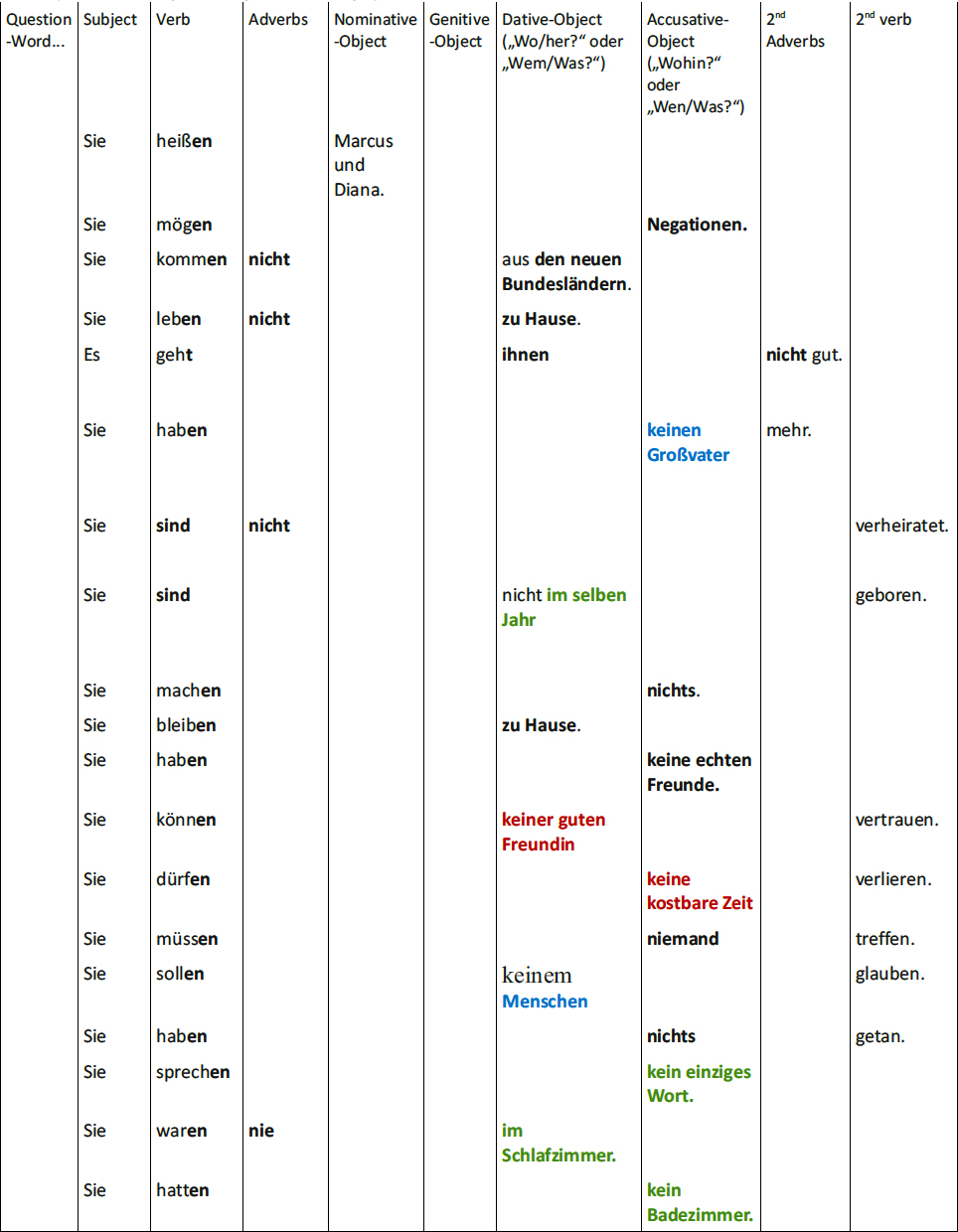


 You are going to Learn:
You are going to Learn:  Common phrases,
Common phrases,  how to express facts using negations,
how to express facts using negations,  the third person plural,
the third person plural,  a lot of new vocabulary and
a lot of new vocabulary and  much more.
much more.
Within the final chapter of the book we consider a couple or a group of people (in our example: “Marcus and Diana”) as “sie” (=”they”) being generally negative. So we have the chance to practice negative expressions in German!
You will find out that some of the nouns are coloured, but that is not really a big deal as we do not focus on the gender of the nouns here. More or less, we concentrate on the way Germans express negations . They use negative expressions like “nicht” (=“not”), “kein/e/r,…”(in English: “no“ in a sense of “not a”), “niemand” (=“nobody”), “nichts” (=“nothing”), “nirgendwo” (=“nowhere”), “niemals! (=“never”). So imagine “them” (Marcus and Diana) as being broadly negative!
This chapter also, of course, focusses on the third person plural and the corresponding verb endings (which are highlighted).
„Sie“ (= the third person plural „They“):
Question-Word… |
Subject |
Verb |
Adverbs |
Nominative-Object |
Genitive-Object |
Dative-Object („Wo/her?“ oder „Wem/Was?“) |
Accusative-Object („Wohin?“ oder „Wen/Was?“) |
2nd Adverbs |
2nd verb |
|
Sie |
heißen |
|
Marcus und Diana. |
|
|
|
|
|
|
Sie |
mögen |
|
|
|
|
Negationen. |
|
|
|
Sie |
kommen |
nicht |
|
|
aus den neuen Bundesländern. |
|
|
|
|
Sie |
leben |
nicht |
|
|
zu Hause. |
|
|
|
|
Es |
geht |
|
|
|
ihnen |
|
nicht gut. |
|
|
Sie |
haben |
|
|
|
|
keinen Großvater |
mehr. |
|
|
Sie |
sind |
nicht |
|
|
|
|
|
verheiratet. |
|
Sie |
sind |
|
|
|
nicht im selben Jahr |
|
|
geboren. |
|
Sie |
machen |
|
|
|
|
nichts. |
|
|
|
Sie |
bleiben |
|
|
|
zu Hause. |
|
|
|
|
Sie |
haben |
|
|
|
|
keine echten Freunde. |
|
|
|
Sie |
können |
|
|
|
keiner guten Freundin |
|
|
vertrauen. |
|
Sie |
dürfen |
|
|
|
|
keine kostbare Zeit |
|
verlieren. |
|
Sie |
müssen |
|
|
|
|
niemand |
|
treffen. |
|
Sie |
sollen |
|
|
|
keinem Menschen |
|
|
glauben. |
|
Sie |
haben |
|
|
|
|
nichts |
|
getan. |
|
Sie |
sprechen |
|
|
|
|
kein einziges Wort. |
|
|
|
Sie |
waren |
nie |
|
|
im Schlafzimmer. |
|
|
|
|
Sie |
hatten |
|
|
|
|
kein Badezimmer. |
|
|

Translations of the sentences above:
Their names are Marcus and Diana.
They like negations.
They do not come from the new federal states.
They don´t live at home.
They don´t feel fine.
They don´t have a grandfather any more.
They are not married.
They were not born in the same year.
They are doing nothing.
They stay at home.
They don´t have real friends.
They cannot trust a good girlfriend.
They may not lose precious time.
They must meet nobody.
They shall not believe anyone.
They have done nothing.
They don´t speak a single word.
They have never been in the bedroom.
They had no bathroom.
At the end of this book I just want to congratulate you: You have taken first quick steps through the German language! Of course, I am going to guide you to the world of learning and improving YOUR German also in the future:
Just stay tuned on www.german-deutsch.com and get in touch!
Or check out “Deutsch lernen mit Mag. Schaller (Level A1) www.german-deutsch.com” (ISBN 978-3-7357-5744-9), my first A1-course book with grammar charts, a lot of useful dialogues and more phrases to memorize!
Finally, keep in mind:
Alles ist möglich! Nichts ist unmöglich!